Digital Citizenship: Social Media's Impact on Activism and Protest
VerifiedAdded on 2020/10/05
|8
|2058
|334
Essay
AI Summary
This essay examines the transformative impact of social media on digital citizenship, activism, and protest. It explores how social media platforms connect individuals, facilitate the sharing of views, and enable the organization of social movements. The analysis delves into the role of digital activism in various regions, highlighting instances where social media has been used to mobilize protests, influence public opinion, and challenge political powers. The essay discusses the concept of digital citizenship, emphasizing the responsibilities and ethical considerations associated with technology use. It also considers the misuse of social media in protests and the challenges faced by governments in regulating online activity. The conclusion underscores the vital role of individuals in activism, emphasizing that technology is a tool, and its impact depends on how it is utilized by people to drive social and political change. The essay references several scholarly sources to support its arguments.
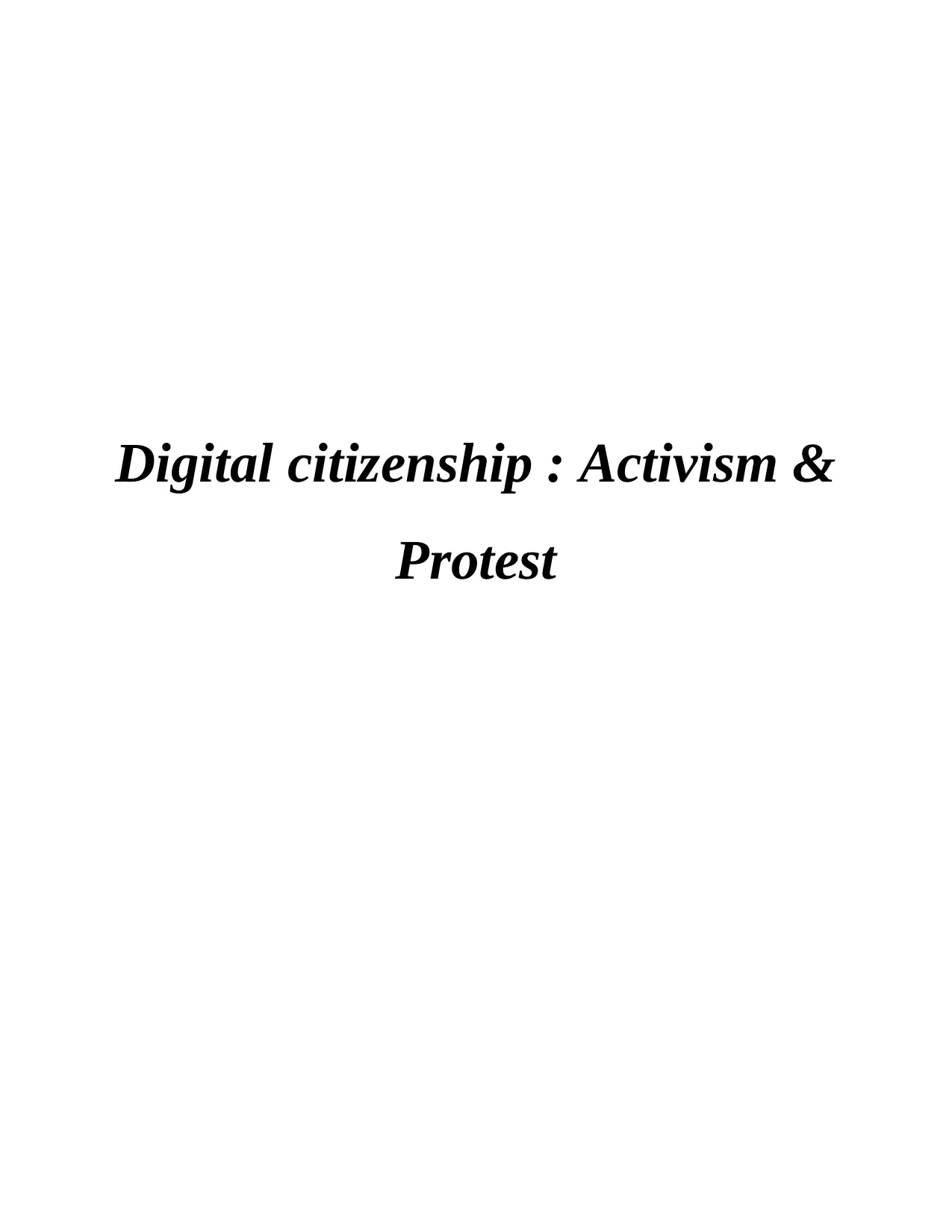
Digital citizenship : Activism &
Protest
Protest
Paraphrase This Document
Need a fresh take? Get an instant paraphrase of this document with our AI Paraphraser
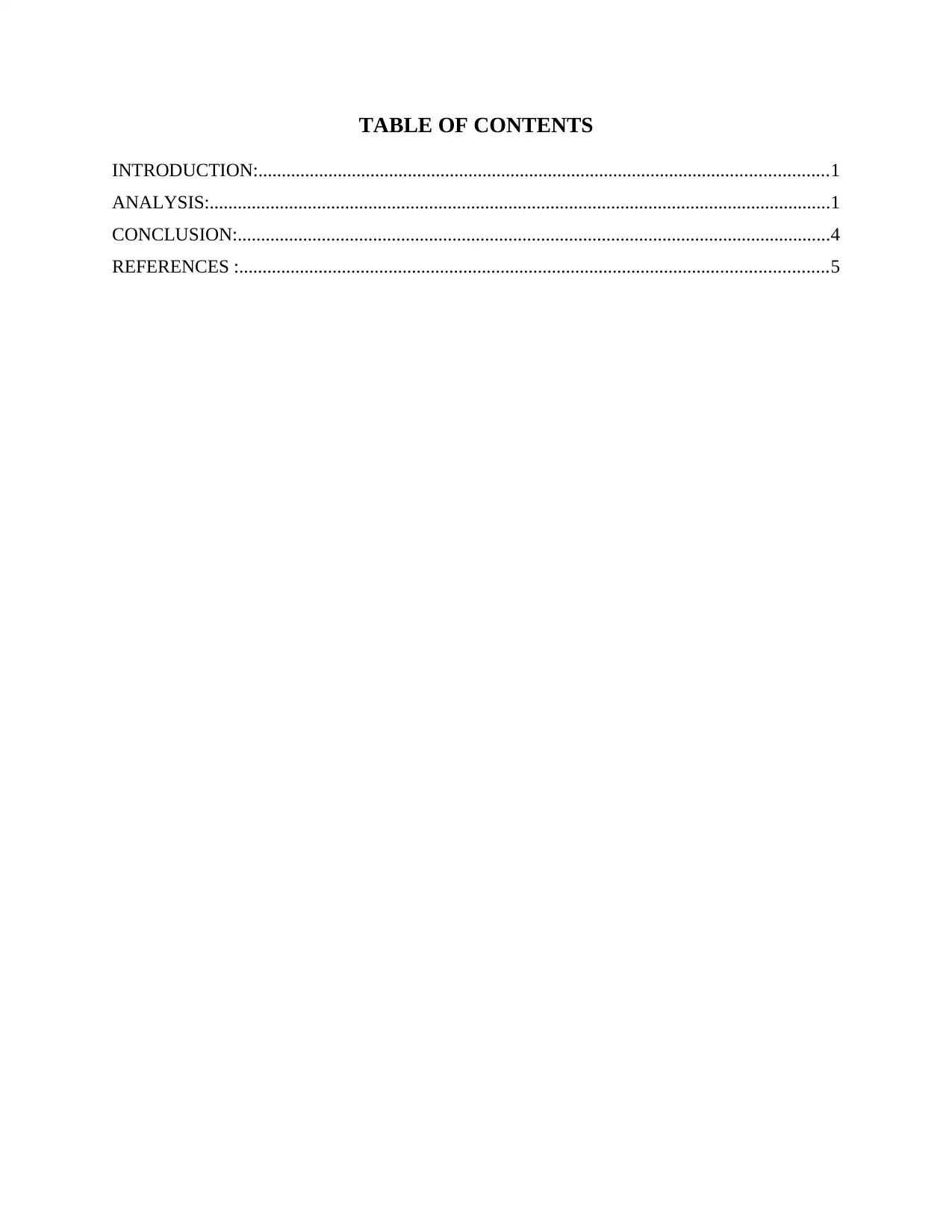
TABLE OF CONTENTS
INTRODUCTION:..........................................................................................................................1
ANALYSIS:.....................................................................................................................................1
CONCLUSION:...............................................................................................................................4
REFERENCES :..............................................................................................................................5
INTRODUCTION:..........................................................................................................................1
ANALYSIS:.....................................................................................................................................1
CONCLUSION:...............................................................................................................................4
REFERENCES :..............................................................................................................................5
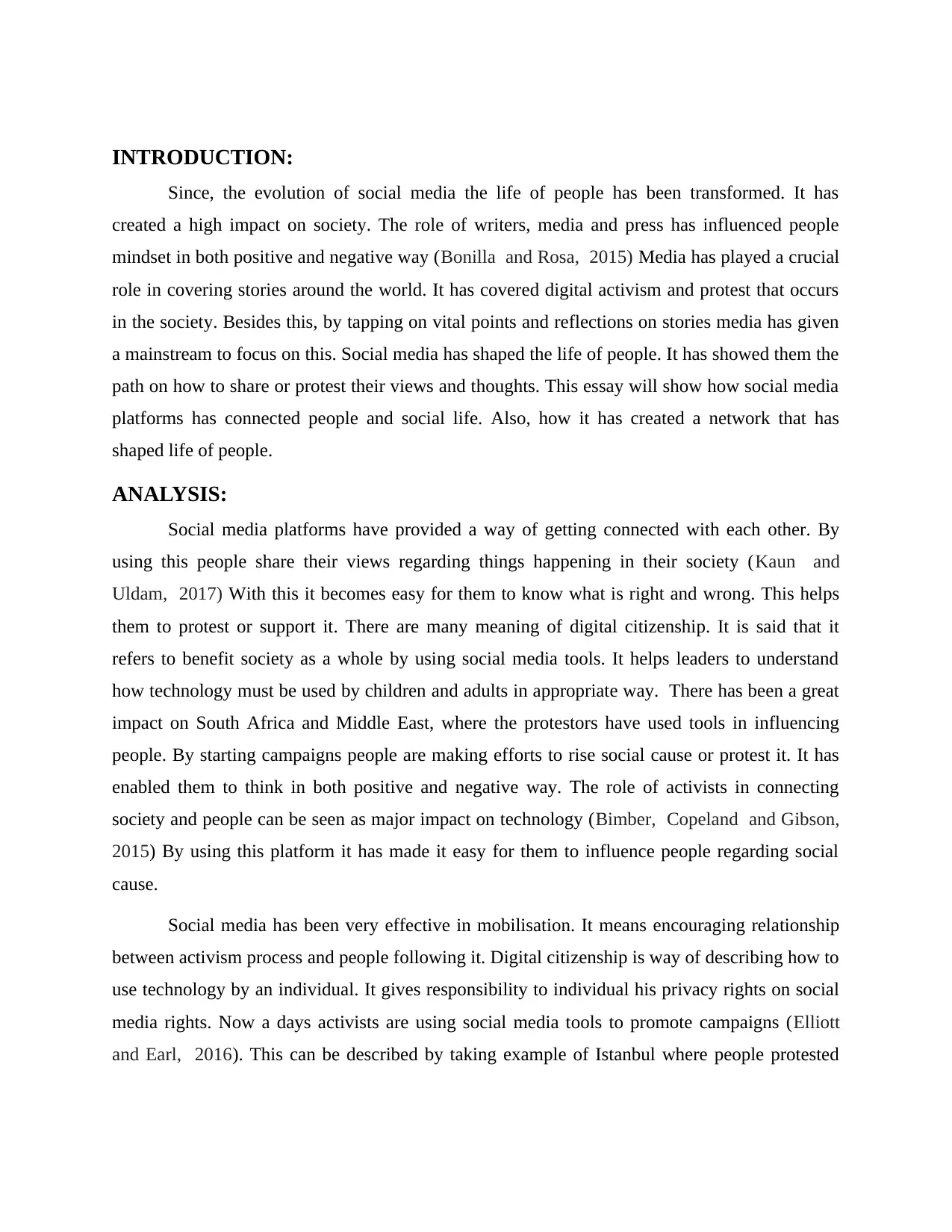
INTRODUCTION:
Since, the evolution of social media the life of people has been transformed. It has
created a high impact on society. The role of writers, media and press has influenced people
mindset in both positive and negative way (Bonilla and Rosa, 2015) Media has played a crucial
role in covering stories around the world. It has covered digital activism and protest that occurs
in the society. Besides this, by tapping on vital points and reflections on stories media has given
a mainstream to focus on this. Social media has shaped the life of people. It has showed them the
path on how to share or protest their views and thoughts. This essay will show how social media
platforms has connected people and social life. Also, how it has created a network that has
shaped life of people.
ANALYSIS:
Social media platforms have provided a way of getting connected with each other. By
using this people share their views regarding things happening in their society (Kaun and
Uldam, 2017) With this it becomes easy for them to know what is right and wrong. This helps
them to protest or support it. There are many meaning of digital citizenship. It is said that it
refers to benefit society as a whole by using social media tools. It helps leaders to understand
how technology must be used by children and adults in appropriate way. There has been a great
impact on South Africa and Middle East, where the protestors have used tools in influencing
people. By starting campaigns people are making efforts to rise social cause or protest it. It has
enabled them to think in both positive and negative way. The role of activists in connecting
society and people can be seen as major impact on technology (Bimber, Copeland and Gibson,
2015) By using this platform it has made it easy for them to influence people regarding social
cause.
Social media has been very effective in mobilisation. It means encouraging relationship
between activism process and people following it. Digital citizenship is way of describing how to
use technology by an individual. It gives responsibility to individual his privacy rights on social
media rights. Now a days activists are using social media tools to promote campaigns (Elliott
and Earl, 2016). This can be described by taking example of Istanbul where people protested
Since, the evolution of social media the life of people has been transformed. It has
created a high impact on society. The role of writers, media and press has influenced people
mindset in both positive and negative way (Bonilla and Rosa, 2015) Media has played a crucial
role in covering stories around the world. It has covered digital activism and protest that occurs
in the society. Besides this, by tapping on vital points and reflections on stories media has given
a mainstream to focus on this. Social media has shaped the life of people. It has showed them the
path on how to share or protest their views and thoughts. This essay will show how social media
platforms has connected people and social life. Also, how it has created a network that has
shaped life of people.
ANALYSIS:
Social media platforms have provided a way of getting connected with each other. By
using this people share their views regarding things happening in their society (Kaun and
Uldam, 2017) With this it becomes easy for them to know what is right and wrong. This helps
them to protest or support it. There are many meaning of digital citizenship. It is said that it
refers to benefit society as a whole by using social media tools. It helps leaders to understand
how technology must be used by children and adults in appropriate way. There has been a great
impact on South Africa and Middle East, where the protestors have used tools in influencing
people. By starting campaigns people are making efforts to rise social cause or protest it. It has
enabled them to think in both positive and negative way. The role of activists in connecting
society and people can be seen as major impact on technology (Bimber, Copeland and Gibson,
2015) By using this platform it has made it easy for them to influence people regarding social
cause.
Social media has been very effective in mobilisation. It means encouraging relationship
between activism process and people following it. Digital citizenship is way of describing how to
use technology by an individual. It gives responsibility to individual his privacy rights on social
media rights. Now a days activists are using social media tools to promote campaigns (Elliott
and Earl, 2016). This can be described by taking example of Istanbul where people protested
⊘ This is a preview!⊘
Do you want full access?
Subscribe today to unlock all pages.

Trusted by 1+ million students worldwide
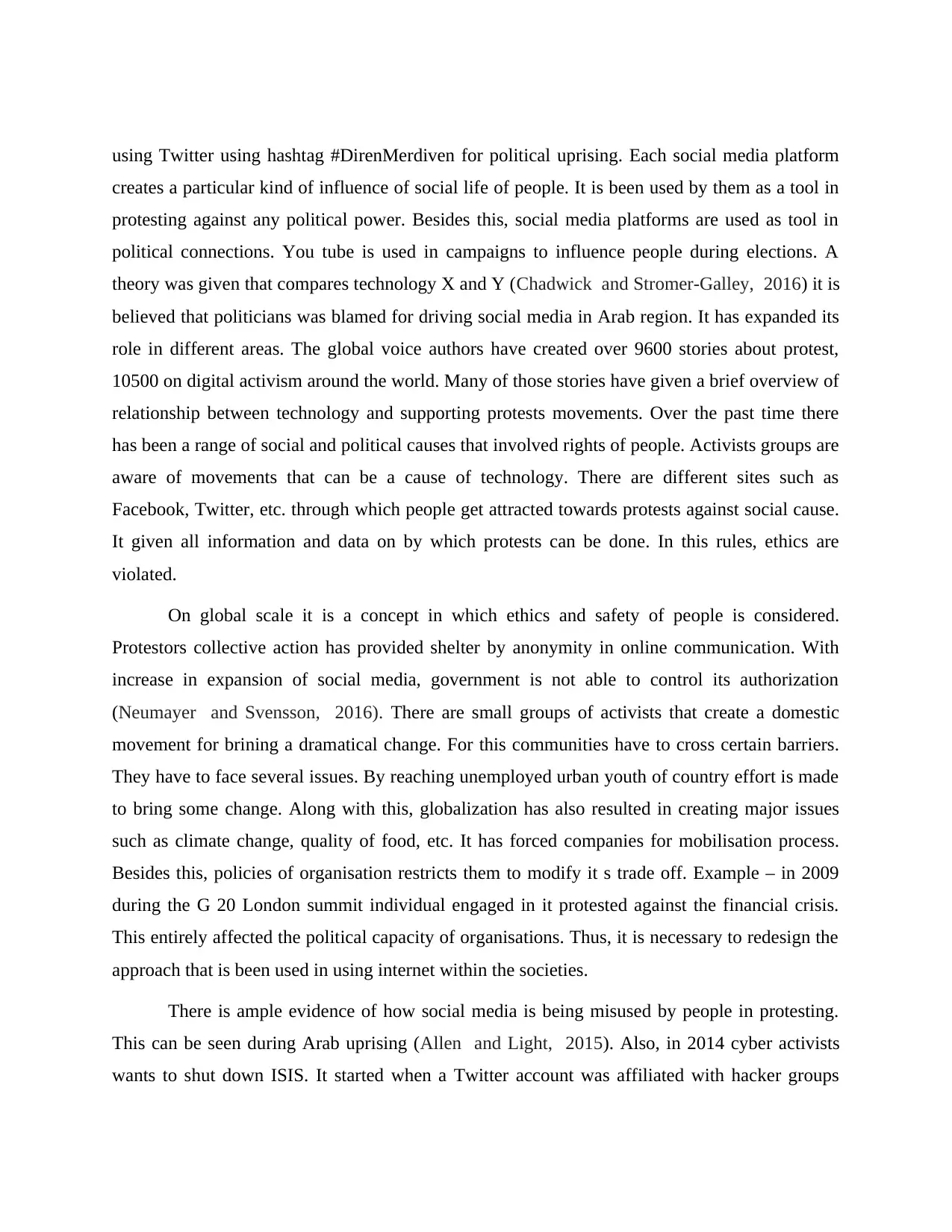
using Twitter using hashtag #DirenMerdiven for political uprising. Each social media platform
creates a particular kind of influence of social life of people. It is been used by them as a tool in
protesting against any political power. Besides this, social media platforms are used as tool in
political connections. You tube is used in campaigns to influence people during elections. A
theory was given that compares technology X and Y (Chadwick and Stromer-Galley, 2016) it is
believed that politicians was blamed for driving social media in Arab region. It has expanded its
role in different areas. The global voice authors have created over 9600 stories about protest,
10500 on digital activism around the world. Many of those stories have given a brief overview of
relationship between technology and supporting protests movements. Over the past time there
has been a range of social and political causes that involved rights of people. Activists groups are
aware of movements that can be a cause of technology. There are different sites such as
Facebook, Twitter, etc. through which people get attracted towards protests against social cause.
It given all information and data on by which protests can be done. In this rules, ethics are
violated.
On global scale it is a concept in which ethics and safety of people is considered.
Protestors collective action has provided shelter by anonymity in online communication. With
increase in expansion of social media, government is not able to control its authorization
(Neumayer and Svensson, 2016). There are small groups of activists that create a domestic
movement for brining a dramatical change. For this communities have to cross certain barriers.
They have to face several issues. By reaching unemployed urban youth of country effort is made
to bring some change. Along with this, globalization has also resulted in creating major issues
such as climate change, quality of food, etc. It has forced companies for mobilisation process.
Besides this, policies of organisation restricts them to modify it s trade off. Example – in 2009
during the G 20 London summit individual engaged in it protested against the financial crisis.
This entirely affected the political capacity of organisations. Thus, it is necessary to redesign the
approach that is been used in using internet within the societies.
There is ample evidence of how social media is being misused by people in protesting.
This can be seen during Arab uprising (Allen and Light, 2015). Also, in 2014 cyber activists
wants to shut down ISIS. It started when a Twitter account was affiliated with hacker groups
creates a particular kind of influence of social life of people. It is been used by them as a tool in
protesting against any political power. Besides this, social media platforms are used as tool in
political connections. You tube is used in campaigns to influence people during elections. A
theory was given that compares technology X and Y (Chadwick and Stromer-Galley, 2016) it is
believed that politicians was blamed for driving social media in Arab region. It has expanded its
role in different areas. The global voice authors have created over 9600 stories about protest,
10500 on digital activism around the world. Many of those stories have given a brief overview of
relationship between technology and supporting protests movements. Over the past time there
has been a range of social and political causes that involved rights of people. Activists groups are
aware of movements that can be a cause of technology. There are different sites such as
Facebook, Twitter, etc. through which people get attracted towards protests against social cause.
It given all information and data on by which protests can be done. In this rules, ethics are
violated.
On global scale it is a concept in which ethics and safety of people is considered.
Protestors collective action has provided shelter by anonymity in online communication. With
increase in expansion of social media, government is not able to control its authorization
(Neumayer and Svensson, 2016). There are small groups of activists that create a domestic
movement for brining a dramatical change. For this communities have to cross certain barriers.
They have to face several issues. By reaching unemployed urban youth of country effort is made
to bring some change. Along with this, globalization has also resulted in creating major issues
such as climate change, quality of food, etc. It has forced companies for mobilisation process.
Besides this, policies of organisation restricts them to modify it s trade off. Example – in 2009
during the G 20 London summit individual engaged in it protested against the financial crisis.
This entirely affected the political capacity of organisations. Thus, it is necessary to redesign the
approach that is been used in using internet within the societies.
There is ample evidence of how social media is being misused by people in protesting.
This can be seen during Arab uprising (Allen and Light, 2015). Also, in 2014 cyber activists
wants to shut down ISIS. It started when a Twitter account was affiliated with hacker groups
Paraphrase This Document
Need a fresh take? Get an instant paraphrase of this document with our AI Paraphraser
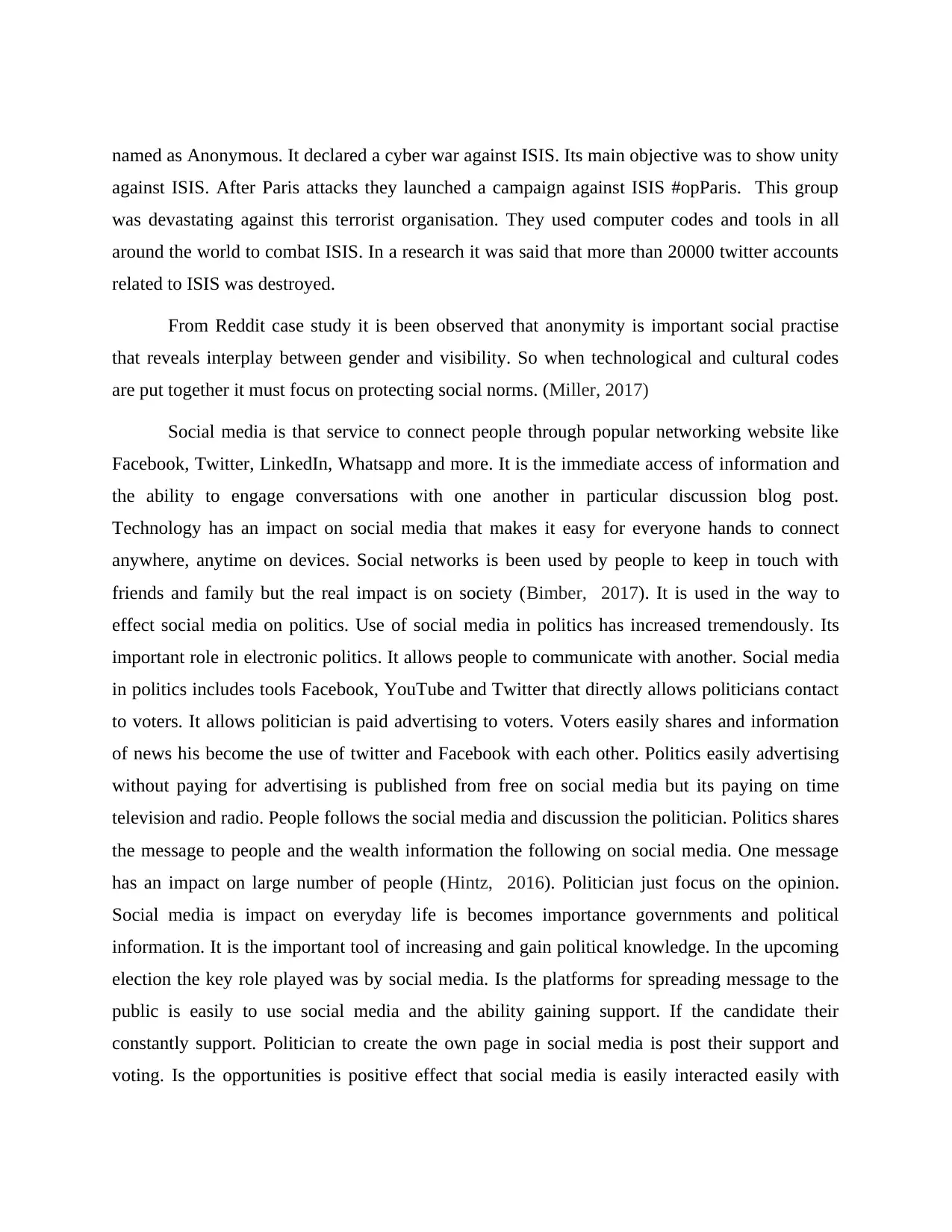
named as Anonymous. It declared a cyber war against ISIS. Its main objective was to show unity
against ISIS. After Paris attacks they launched a campaign against ISIS #opParis. This group
was devastating against this terrorist organisation. They used computer codes and tools in all
around the world to combat ISIS. In a research it was said that more than 20000 twitter accounts
related to ISIS was destroyed.
From Reddit case study it is been observed that anonymity is important social practise
that reveals interplay between gender and visibility. So when technological and cultural codes
are put together it must focus on protecting social norms. (Miller, 2017)
Social media is that service to connect people through popular networking website like
Facebook, Twitter, LinkedIn, Whatsapp and more. It is the immediate access of information and
the ability to engage conversations with one another in particular discussion blog post.
Technology has an impact on social media that makes it easy for everyone hands to connect
anywhere, anytime on devices. Social networks is been used by people to keep in touch with
friends and family but the real impact is on society (Bimber, 2017). It is used in the way to
effect social media on politics. Use of social media in politics has increased tremendously. Its
important role in electronic politics. It allows people to communicate with another. Social media
in politics includes tools Facebook, YouTube and Twitter that directly allows politicians contact
to voters. It allows politician is paid advertising to voters. Voters easily shares and information
of news his become the use of twitter and Facebook with each other. Politics easily advertising
without paying for advertising is published from free on social media but its paying on time
television and radio. People follows the social media and discussion the politician. Politics shares
the message to people and the wealth information the following on social media. One message
has an impact on large number of people (Hintz, 2016). Politician just focus on the opinion.
Social media is impact on everyday life is becomes importance governments and political
information. It is the important tool of increasing and gain political knowledge. In the upcoming
election the key role played was by social media. Is the platforms for spreading message to the
public is easily to use social media and the ability gaining support. If the candidate their
constantly support. Politician to create the own page in social media is post their support and
voting. Is the opportunities is positive effect that social media is easily interacted easily with
against ISIS. After Paris attacks they launched a campaign against ISIS #opParis. This group
was devastating against this terrorist organisation. They used computer codes and tools in all
around the world to combat ISIS. In a research it was said that more than 20000 twitter accounts
related to ISIS was destroyed.
From Reddit case study it is been observed that anonymity is important social practise
that reveals interplay between gender and visibility. So when technological and cultural codes
are put together it must focus on protecting social norms. (Miller, 2017)
Social media is that service to connect people through popular networking website like
Facebook, Twitter, LinkedIn, Whatsapp and more. It is the immediate access of information and
the ability to engage conversations with one another in particular discussion blog post.
Technology has an impact on social media that makes it easy for everyone hands to connect
anywhere, anytime on devices. Social networks is been used by people to keep in touch with
friends and family but the real impact is on society (Bimber, 2017). It is used in the way to
effect social media on politics. Use of social media in politics has increased tremendously. Its
important role in electronic politics. It allows people to communicate with another. Social media
in politics includes tools Facebook, YouTube and Twitter that directly allows politicians contact
to voters. It allows politician is paid advertising to voters. Voters easily shares and information
of news his become the use of twitter and Facebook with each other. Politics easily advertising
without paying for advertising is published from free on social media but its paying on time
television and radio. People follows the social media and discussion the politician. Politics shares
the message to people and the wealth information the following on social media. One message
has an impact on large number of people (Hintz, 2016). Politician just focus on the opinion.
Social media is impact on everyday life is becomes importance governments and political
information. It is the important tool of increasing and gain political knowledge. In the upcoming
election the key role played was by social media. Is the platforms for spreading message to the
public is easily to use social media and the ability gaining support. If the candidate their
constantly support. Politician to create the own page in social media is post their support and
voting. Is the opportunities is positive effect that social media is easily interacted easily with
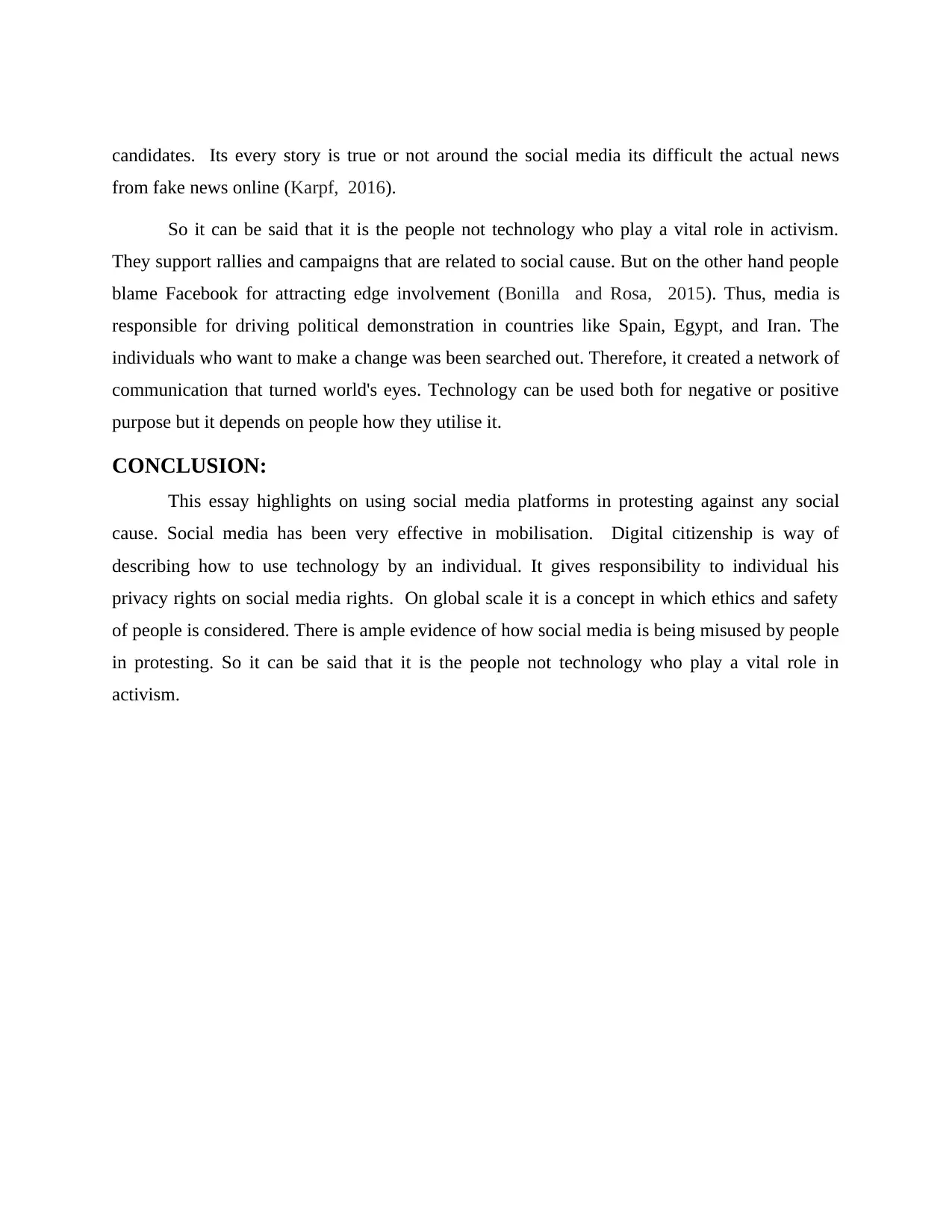
candidates. Its every story is true or not around the social media its difficult the actual news
from fake news online (Karpf, 2016).
So it can be said that it is the people not technology who play a vital role in activism.
They support rallies and campaigns that are related to social cause. But on the other hand people
blame Facebook for attracting edge involvement (Bonilla and Rosa, 2015). Thus, media is
responsible for driving political demonstration in countries like Spain, Egypt, and Iran. The
individuals who want to make a change was been searched out. Therefore, it created a network of
communication that turned world's eyes. Technology can be used both for negative or positive
purpose but it depends on people how they utilise it.
CONCLUSION:
This essay highlights on using social media platforms in protesting against any social
cause. Social media has been very effective in mobilisation. Digital citizenship is way of
describing how to use technology by an individual. It gives responsibility to individual his
privacy rights on social media rights. On global scale it is a concept in which ethics and safety
of people is considered. There is ample evidence of how social media is being misused by people
in protesting. So it can be said that it is the people not technology who play a vital role in
activism.
from fake news online (Karpf, 2016).
So it can be said that it is the people not technology who play a vital role in activism.
They support rallies and campaigns that are related to social cause. But on the other hand people
blame Facebook for attracting edge involvement (Bonilla and Rosa, 2015). Thus, media is
responsible for driving political demonstration in countries like Spain, Egypt, and Iran. The
individuals who want to make a change was been searched out. Therefore, it created a network of
communication that turned world's eyes. Technology can be used both for negative or positive
purpose but it depends on people how they utilise it.
CONCLUSION:
This essay highlights on using social media platforms in protesting against any social
cause. Social media has been very effective in mobilisation. Digital citizenship is way of
describing how to use technology by an individual. It gives responsibility to individual his
privacy rights on social media rights. On global scale it is a concept in which ethics and safety
of people is considered. There is ample evidence of how social media is being misused by people
in protesting. So it can be said that it is the people not technology who play a vital role in
activism.
⊘ This is a preview!⊘
Do you want full access?
Subscribe today to unlock all pages.

Trusted by 1+ million students worldwide
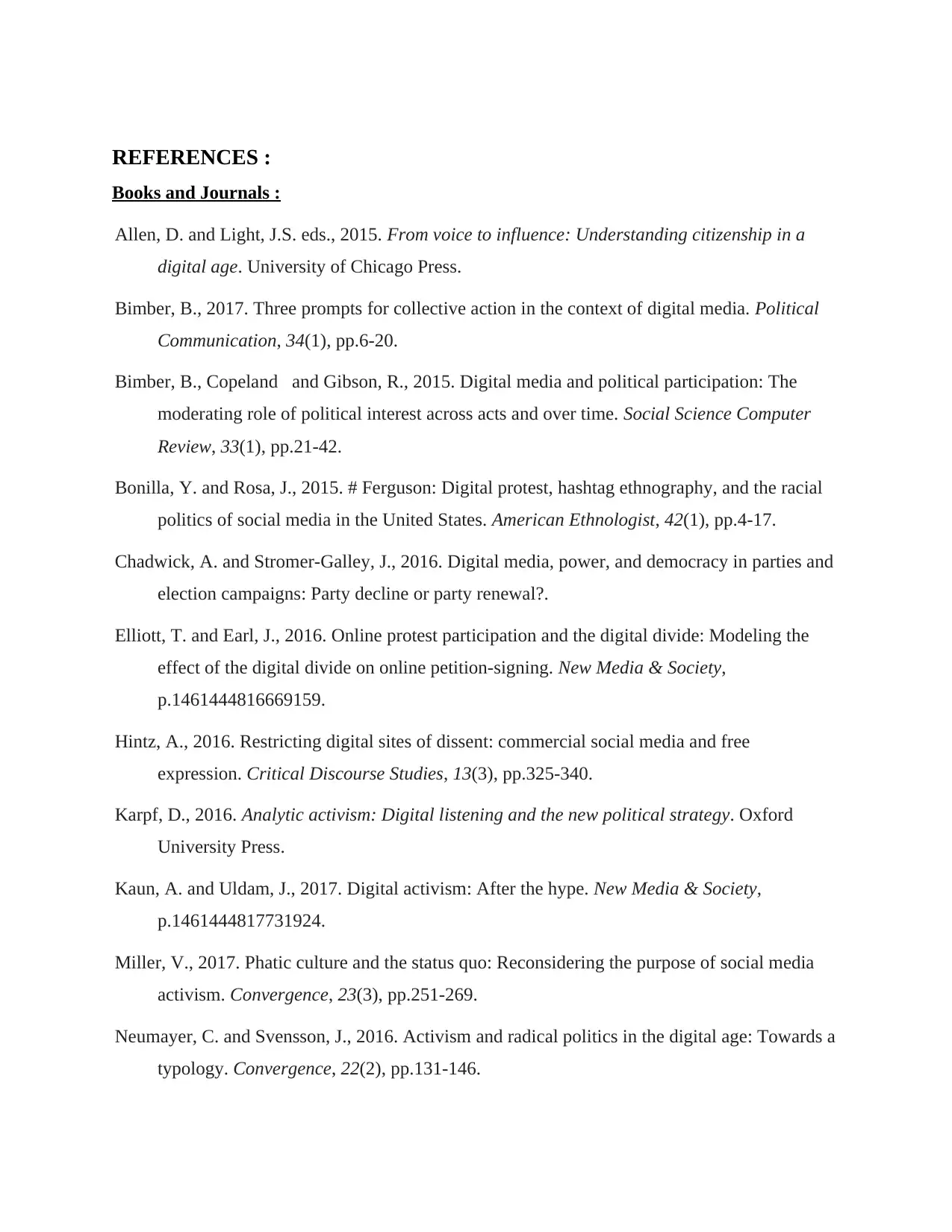
REFERENCES :
Books and Journals :
Allen, D. and Light, J.S. eds., 2015. From voice to influence: Understanding citizenship in a
digital age. University of Chicago Press.
Bimber, B., 2017. Three prompts for collective action in the context of digital media. Political
Communication, 34(1), pp.6-20.
Bimber, B., Copeland and Gibson, R., 2015. Digital media and political participation: The
moderating role of political interest across acts and over time. Social Science Computer
Review, 33(1), pp.21-42.
Bonilla, Y. and Rosa, J., 2015. # Ferguson: Digital protest, hashtag ethnography, and the racial
politics of social media in the United States. American Ethnologist, 42(1), pp.4-17.
Chadwick, A. and Stromer-Galley, J., 2016. Digital media, power, and democracy in parties and
election campaigns: Party decline or party renewal?.
Elliott, T. and Earl, J., 2016. Online protest participation and the digital divide: Modeling the
effect of the digital divide on online petition-signing. New Media & Society,
p.1461444816669159.
Hintz, A., 2016. Restricting digital sites of dissent: commercial social media and free
expression. Critical Discourse Studies, 13(3), pp.325-340.
Karpf, D., 2016. Analytic activism: Digital listening and the new political strategy. Oxford
University Press.
Kaun, A. and Uldam, J., 2017. Digital activism: After the hype. New Media & Society,
p.1461444817731924.
Miller, V., 2017. Phatic culture and the status quo: Reconsidering the purpose of social media
activism. Convergence, 23(3), pp.251-269.
Neumayer, C. and Svensson, J., 2016. Activism and radical politics in the digital age: Towards a
typology. Convergence, 22(2), pp.131-146.
Books and Journals :
Allen, D. and Light, J.S. eds., 2015. From voice to influence: Understanding citizenship in a
digital age. University of Chicago Press.
Bimber, B., 2017. Three prompts for collective action in the context of digital media. Political
Communication, 34(1), pp.6-20.
Bimber, B., Copeland and Gibson, R., 2015. Digital media and political participation: The
moderating role of political interest across acts and over time. Social Science Computer
Review, 33(1), pp.21-42.
Bonilla, Y. and Rosa, J., 2015. # Ferguson: Digital protest, hashtag ethnography, and the racial
politics of social media in the United States. American Ethnologist, 42(1), pp.4-17.
Chadwick, A. and Stromer-Galley, J., 2016. Digital media, power, and democracy in parties and
election campaigns: Party decline or party renewal?.
Elliott, T. and Earl, J., 2016. Online protest participation and the digital divide: Modeling the
effect of the digital divide on online petition-signing. New Media & Society,
p.1461444816669159.
Hintz, A., 2016. Restricting digital sites of dissent: commercial social media and free
expression. Critical Discourse Studies, 13(3), pp.325-340.
Karpf, D., 2016. Analytic activism: Digital listening and the new political strategy. Oxford
University Press.
Kaun, A. and Uldam, J., 2017. Digital activism: After the hype. New Media & Society,
p.1461444817731924.
Miller, V., 2017. Phatic culture and the status quo: Reconsidering the purpose of social media
activism. Convergence, 23(3), pp.251-269.
Neumayer, C. and Svensson, J., 2016. Activism and radical politics in the digital age: Towards a
typology. Convergence, 22(2), pp.131-146.
Paraphrase This Document
Need a fresh take? Get an instant paraphrase of this document with our AI Paraphraser
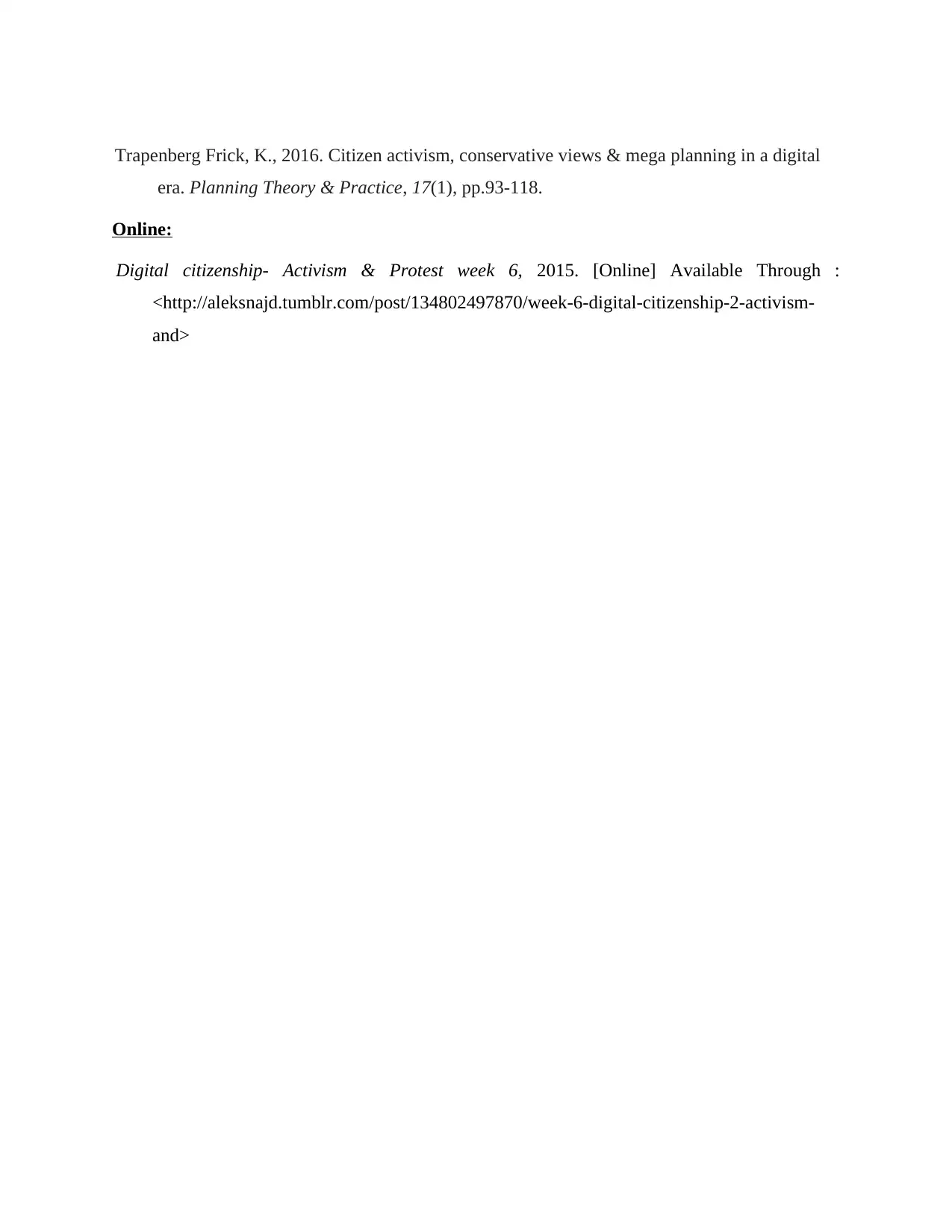
Trapenberg Frick, K., 2016. Citizen activism, conservative views & mega planning in a digital
era. Planning Theory & Practice, 17(1), pp.93-118.
Online:
Digital citizenship- Activism & Protest week 6, 2015. [Online] Available Through :
<http://aleksnajd.tumblr.com/post/134802497870/week-6-digital-citizenship-2-activism-
and>
era. Planning Theory & Practice, 17(1), pp.93-118.
Online:
Digital citizenship- Activism & Protest week 6, 2015. [Online] Available Through :
<http://aleksnajd.tumblr.com/post/134802497870/week-6-digital-citizenship-2-activism-
and>
1 out of 8
Related Documents
Your All-in-One AI-Powered Toolkit for Academic Success.
+13062052269
info@desklib.com
Available 24*7 on WhatsApp / Email
![[object Object]](/_next/static/media/star-bottom.7253800d.svg)
Unlock your academic potential
Copyright © 2020–2026 A2Z Services. All Rights Reserved. Developed and managed by ZUCOL.





